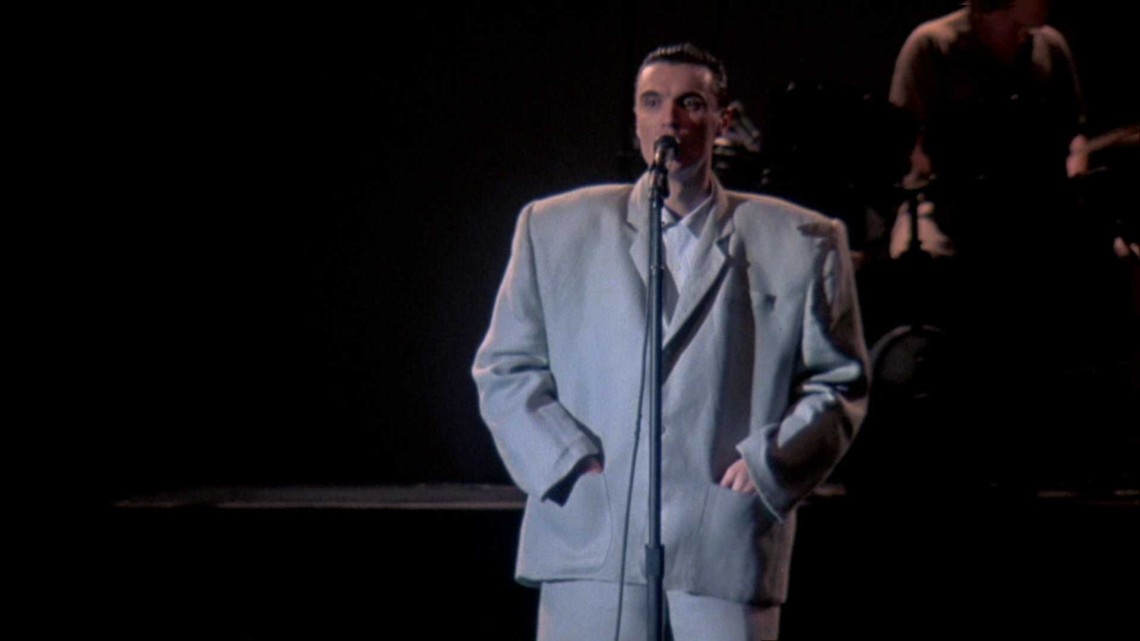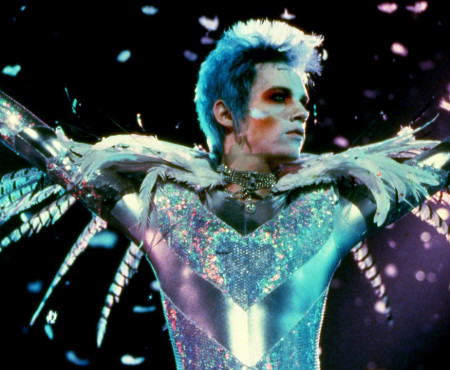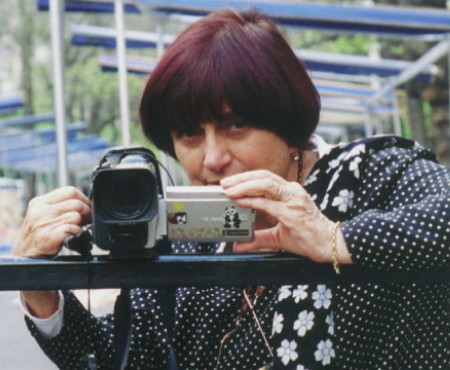For all its formal inventiveness and the quality of its subject, the band Talking Heads, Stop Making Sense may be the best concert film of all time because it actually tells a story. It begins with art rock overlord David Byrne wandering out alone on a stage that looks like an expressionistically cavernous rendering of a high school drama theater—a black box with only partially removed backdrops and pieces of scaffolding. Byrne himself is dressed like a STEM student, with an informal suit made even less dressy by the white sneakers that the camera captures before showing any other part of the frontman’s body. Armed with an acoustic guitar and a boombox, Byrne hits ‘play’ on the stereo and begins to strum along to the primitive beat, belting out Talking Heads’ breakout single “Psycho Killer,” an unsettlingly catchy tune made eerier by Byrne’s solitude and loner image.
Then, people slowly begin to join him. Band bassist Tina Weymouth comes up to duet on “Heaven,” the group’s dispassionately ironic description of heaven as a place where nothing ever happens. The rest of the original quartet comes up over the next few songs, and then the stage swells to a figurative burst with backing musicians who augment the group’s spiky post-punk with Afrobeat polyrhythms, R&B backing vocals, and electro-funk. By the time the full group coalesces on-stage for “Burning Down the House,” it’s a distinct possibility they’ll do just that for having too much equipment and wires all strewn together. In effect, the film’s first section is a one-act play of a geeky loner making friends and finding a purpose in life, and that nonverbal story may explain the Talking Heads’ enduring appeal as the most accessible of art bands.
As for the concert itself, it’s gangbusters. “Burning Down the House” feels like a marathon, with the band sprinting in place as Byrne doesn’t so much move with the music as throw himself out of spinal alignment. In “Life During Wartime,” he turns into a sine wave, oscillating back and forth to the song’s synth pattern. And given the sheer size of the touring band, the musical cohesion is unfathomable: prog giants King Crimson basically spent the ‘80s ripping off the musical complexity underpinning Talking Heads, and “Making Flippy Floppy” returns the favor, leaping between angular guitars, rubber-band funk and jazz fusion keyboard until all the pieces fall together into a composition that would sound like a collage were it all not so bizarrely logical. “Take Me to the River” turns Al Green’s sensual gospel hit into an Earth, Wind and Fire jam, complete with James Brown-esque breakdowns and stop-starts.
Taken on its own, the music and the band’s athleticism are enough to make this a concert film for the ages, but it’s the synergy between director Jonathan Demme and Byrne that seals this as a masterpiece. Demme adapts beautifully to Byrne’s stringent aesthetic demands, and the monochromatic chiaroscuro of the lighting leads to greater possibilities of style than the many-colored, laser-filled extravaganzas of the era. The near-single take of “Once in a Lifetime,” with the camera firmly trained on Byrne as he jerks around in a disheveled suit and prop glasses like Clark Kent trying to keep his cover while near some kryptonite, is justly famous. But for my money the most dazzling bit of light comes from the on-stage house lamp brought out for a pas de deux in “This Must Be the Place (Naive Melody).”
When the camera shows the crowd at all, it is as backlit silhouettes dotting the space below the stage; otherwise, Demme is here to see the band, and he pulls every string to ensure he always has a front-row seat. This hyperfocused approach is not unprecedented, but Demme uses it to coax out the full impact of the band’s individual pyrotechnics, the live-wire fireworks of Byrne’s chess club speed freak dancing, and the way that this group of dispirited art students and guitars-for-hire attained a level of musical communication that most would kill to have. By the time Byrne ambles into view in a vast, ill-fitting suit to shuffle to “Girlfriend Is Better,” the line between irony and sincerity has completely disappeared, and so has the stark gulf between lens and subject. Stop Making Sense may cement Talking Heads as the smartest band of the ‘80s, but it ends up making a case for them being the most personal one as well.
If you’re interesting in watching Stop Making Sense on Fandor, use your Movie Mezzanine coupon for an exclusive discount and access to a breathtaking library of cinema!





















One thought on “Spotlight on Fandor: “Stop Making Sense””
Easily one of the greatest concert films ever and definitely wild in every way.